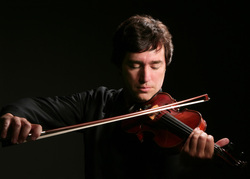
These days, one of the more welcome developments in the classical-music world is the profusion of chamber orchestras. Eastern Europe’s Kremerata Baltica and Moscow Soloists are export industries. And in the United States, there’s been a recent surge of new chamber orchestras, in New York, Boston, Los Angeles and other cities.
That’s a pretty good description of the International Chamber Soloists – brought to Toronto on Sunday afternoon by Mooredale Concerts for a performance at the University of Toronto’s Walter Hall. Founded in 2004 by the Russian-American violinist Dmitri Berlinsky, who both leads and plays in the group, the ICS is made up of musicians in their 20s from all over the world. (Berlinsky is older, in his early 40s.)
With a roster of just 11 players, the ICS is about as small as an orchestra can be. But even though there are only two or three players for each section, they punch well above their weight. These musicians approach everything they play with an infectious alacrity that makes small imperfections easy to forgive.
All this was apparent from the first work on the program, Mendelssohn’s Violin Concerto in D Minor. For this early work (not to be confused with Mendelssohn’s famous Concerto in E Minor), Berlinsky stepped forward as soloist.
To be sure, he’s an impressive violinist, with a dazzling technique and a strong, rich tone. In his role as the “alpha male” of the orchestra, he communicated his intentions clearly and emphatically to his players. Their response was no less clear: Phrasing and dynamics mirrored Berlinsky’s in a fine show of stylistic unity.
But with so few players for each part, even slight discrepancies in intonation were audible – and this problem had a way of rearing its head from time to time. Moreover, Berlinsky’s penchant for brisk tempos sometimes left his young players hard-pressed to keep up with him in trickier passages.
Excerpts from The Four Seasons of Buenos Aires, by the Argentine composer Astor Piazzolla, offered a marked contrast to the Mendelssohn. In the two movements performed – Summer and Spring – Berlinsky again played the solo violin part. Beginning with a jazzy, slithering glissando, he proved that he can be a wild and crazy guy when he wants to. Yet even as he negotiated every obstacle Piazzolla could throw his way, he kept his band of string players on a firm rhythmic course.
In Tchaikovsky’s Souvenir de Florence the instrumental forces were arranged somewhat differently, with Berlinsky joining his orchestra’s small first violin section.
Originally, Souvenir de Florence was written for six players, one for each part, and the doubling of forces gave the work a luxuriant quality. That, and Berlinsky’s leadership, made this the most successful piece of the afternoon.
All that was admirable about the ICS – the warmth, energy and enthusiasm – seemed to come into focus in the Tchaikovsky. This was especially true of in the third movement, which was glorious and grand, with a generous vibrato. The final movement again posed a few intonation challenges to the orchestra, but Berlinsky effectively steered the lively piece to a decisive all’s well that ends well conclusion.
There were two encores. The first movement of Winter from Vivaldi’s The Four Seasons again brought Berlinsky to the front of the stage for yet another fleet-fingered solo. Finally, If I Were a Rich Man from Fiddler on the Roof was a pleasant little surprise.
© Colin Eatock 2012
 RSS Feed
RSS Feed

